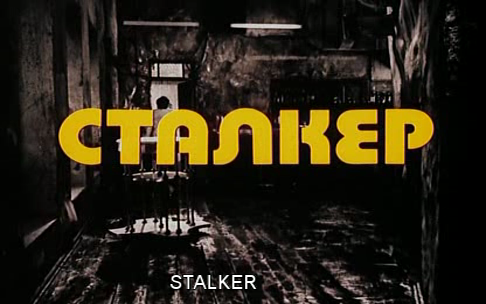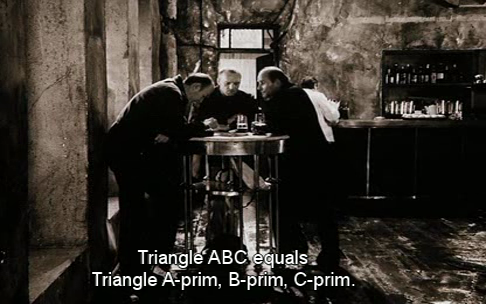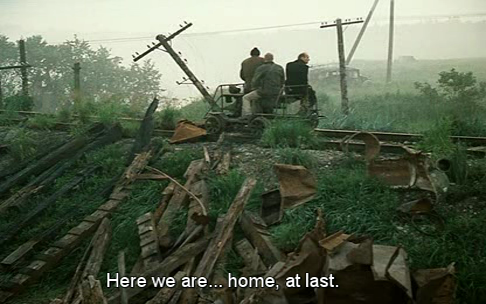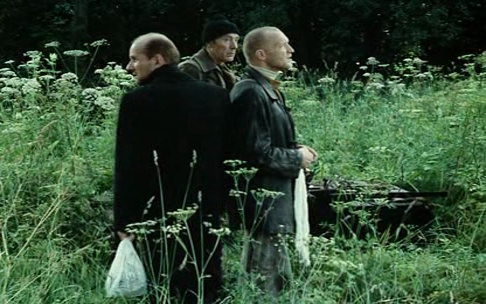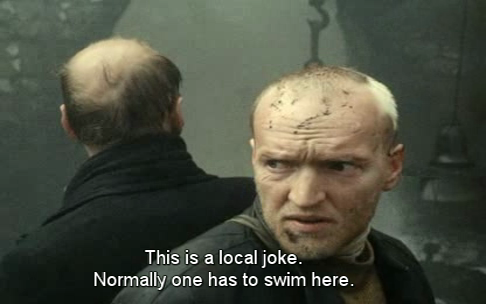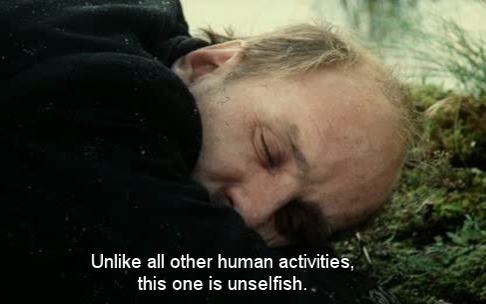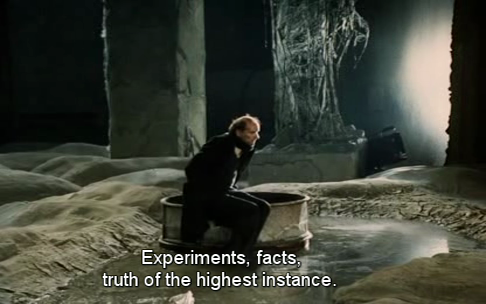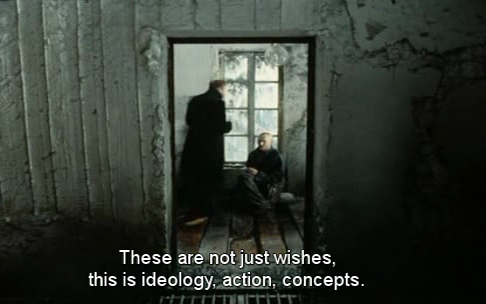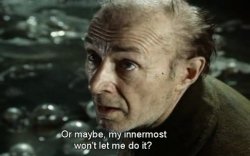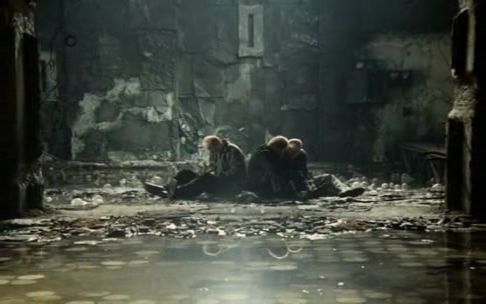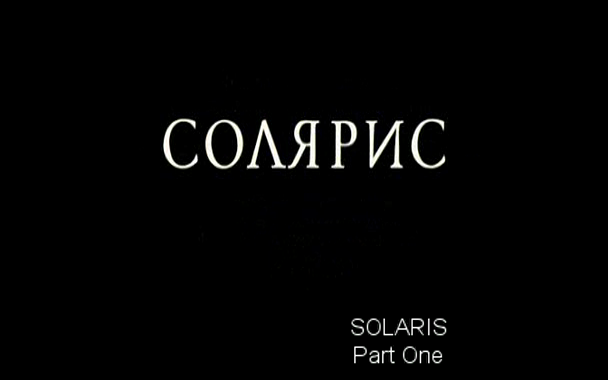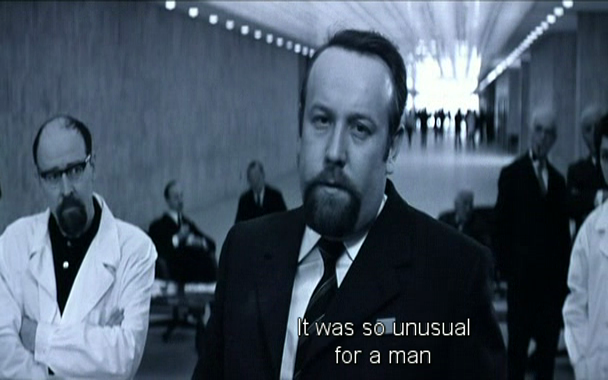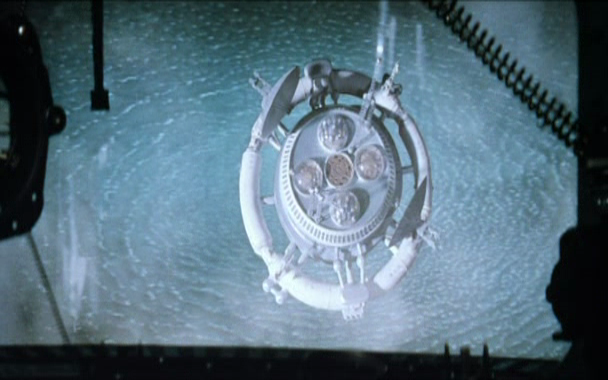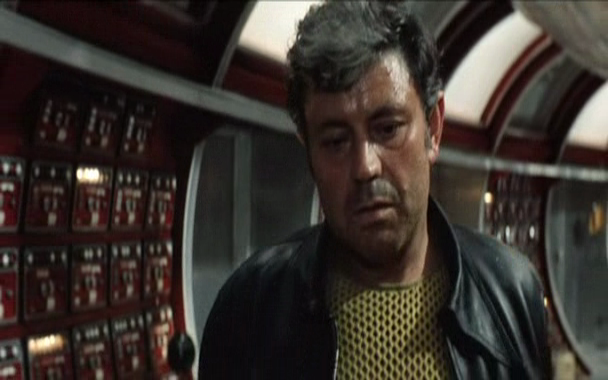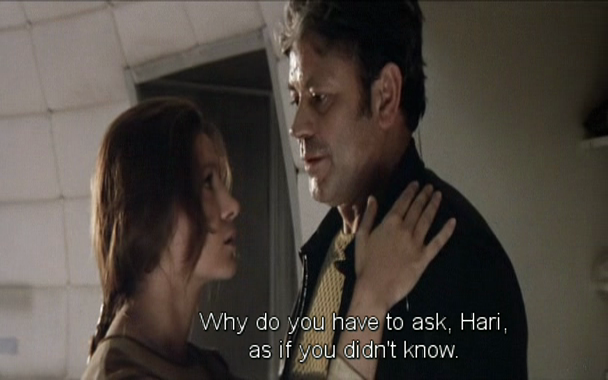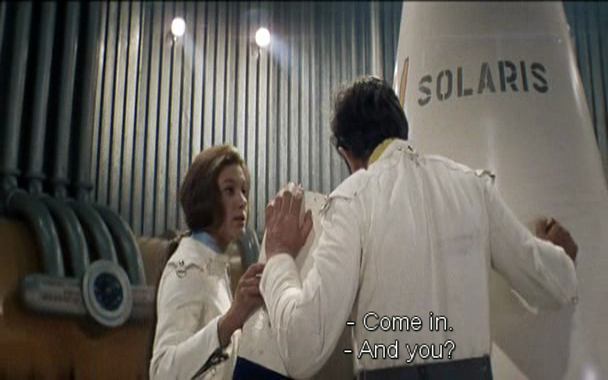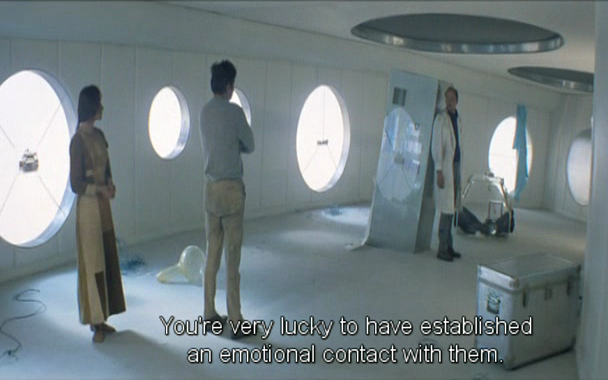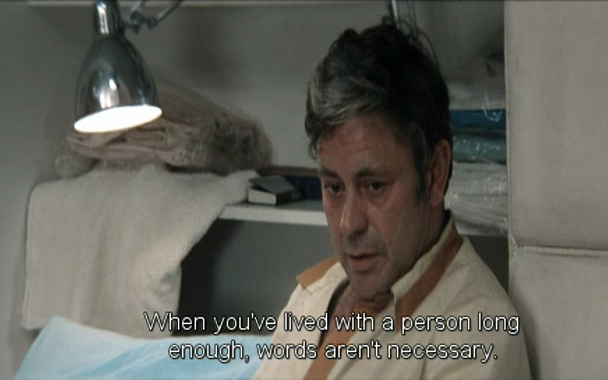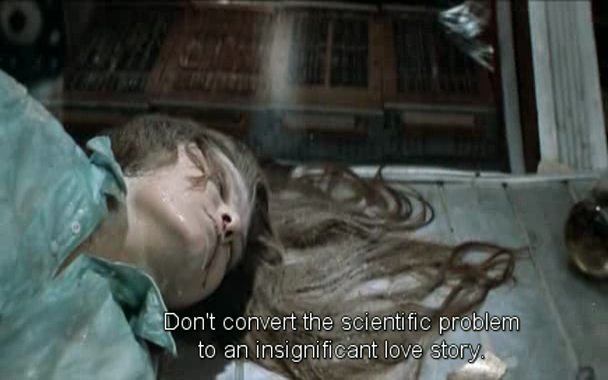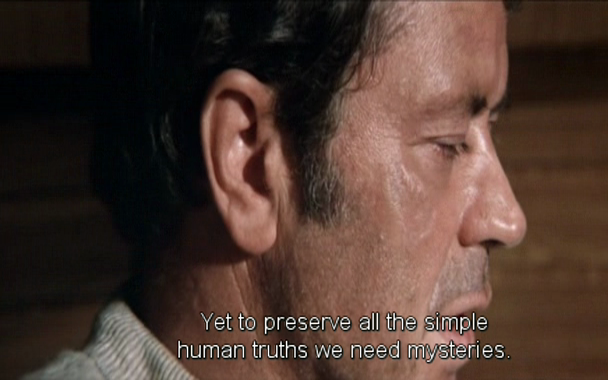-
#24 – Stalker (1979)
Stalker (1979)
Director: Andrei Tarkovsky
Another science-fiction film directed by Andrei Tarkovsky, exploring the mysterious “Zone”…
In a home, we find a wife and child of The Stalker: A man who is hired by people to lead them through “The Zone”: A strange place where the laws of physics no longer apply. Within The Zone, there is a place called The Room, where people can go to get there one true wish fulfilled. The Stalker’s wife pleads with him not to go again to that dangerous place, but he ignores her pleas.
Stalker is hired by two men to escort them to The Zone. At a local bar, he meets the men, calling themselves “Professor” and “Writer”, who wish to find The Room and make their wish. The three set off through a military blockade that surrounds The Zone, avoiding patrols and gunfire, and finding a railcar to take them into The Zone itself…
The three arrive in The Zone, which resembles an overgrown area of countryside, with ruined debris scattered around. The lack of any sound gives it away that there is something not quite right about where they are. Stalker tells Professor and Writer to follow his instructions exactly, or they will be killed. He ties nuts/bolts to pieces of cloth, and throws them in the direction he works out is the best way to travel, to test out the safety of the route. The Writer is constantly skeptical of The Stalker’s odd actions, but The Professor generally follows his advice.
The two men have different reasons for visiting The Room. The Writer finds himself lacking in inspiration to write, and is hoping he can re-ignite his passions, while The Professor is hoping he can win the Nobel Prize. The Stalker mentions his mentor, Porcupine, who lead his Brother to death in The Zone, and wished for riches in The Room. However, a week later, he hung himself.
After travelling via a route of overgrown fields, underground tunnels and sand filled rooms, the three arrive outside The Room. There, a strangely placed phone begins to ring. the Writer answers and tells the person on the other end “This is not the clinic” and hangs up. Next, The Professor dials a number on the phone to brag to someone on the other end, and hangs up. The Stalker warns them both that The Room does not grant the wish they ask aloud, but it grants the true unconscious wish that resides deep within them. After this, the Professor reveals the real reason he came to The Room: He pulls out a bomb, saying that the power to grant wishes could be used for evil and terrible deeds, and because man should not have such power, needed to be destroyed. The three fight physically, and after a while, the Professor backs down from his plan, and the three sit down on the ground in defeat, none of them wishing to head into The Room and dare to have their wishes fulfilled…
Back in town, the three men are sitting in the bar where they first met. Stalker’s wife comes in and sees a dog that had got attached to Stalker and had followed him out of The Zone. Stalker then leaves the bar with his wife, the dog, and his child “Monkey”, who it was hinted at the start of the movie and now confirmed that she cannot walk on her legs without support (apparently she was born this way, and is a consequence of her father being a Stalker).
At home, Stalker’s wife tells him she has considered visiting The Room herself. Now, Stalker is having doubts about The Zone’s nature, and worries that her wishes would not be fulfilled. In a monologue to the camera, the Wife talks about whether she should leave Stalker, and the choices she has made by staying with him. She eventually re-confirms her commitment to him, while in the kitchen, Monkey sits at the table reciting a poem, she them apparently moves three glasses with the power of her mind (psychokinesis), and after the third glass falls to the floor, a train is heard going past the house, which causes it to shake…
A bit of background about this movie…this is another movie by Andrei Tarkovsky, most famously known for his 1972 movie Solaris. A lot of the production techniques used in that movie, such as long shots, steady camera motions, a slowly revealed plot, and a sparse and minimal soundtrack, were according to Tarkovsky himself much more refined in Stalker. Again, similar to Solaris, the movie is based on a novel, this one being Roadside Picnic by Boris and Arkady Strugatsky. The film deviates massively from the novel though, so much so that the only thing they really have in common are the terms “Stalker” and “Zone”. I think Tarkovsky took the novels concept as a base and applied his established style of filmmaking to it.
There is very little background and detail dedicated to the origins and mysteries of The Zone, why the military has surrounded it, and suchforth. Tarkovsky has expressed his dislike of western science-fiction, which focuses on flashy technology and quick changes in narratives and scenes. Stalker has a slowly revealed narrative that focuses on these three men as if they are the only people that matter. There discourse in some of the longer scenes reveals the impact of The Zone and it’s potential for the human race, and I think this is where Tarkovsky wants uis to focus our attention: On the conscious and unconscious aspects of human nature, and the insecurities and desires, both on the surface and deep within us, that makes us human.
Apparently, Tarkovsky went through 5000 metres of film while making this movie, and that isn’t a surprise when the movie has a runtime of over two and a half hours. Tarkovsky says with regards to the pacing at the beginning that “The film needs to be slower and duller at the start so that the viewers who walked into the wrong theatre have time to leave before the main action starts.” The fact that we have to wait nearly ten minutes into the film before we get the first bits of spoken daialogue is certainly proof of that. Also, I think Tarkovsky’s definition of “action” and ours is probably different, in a similar way to which our definition of science-fiction doesn’t perhaps match up to what happens in this film.
The world portrayed in Stalker is a ruined and desolate one, and it is easy to see why people would want to face the dangers of The Zone in order to get their wish granted. The world outside The Zone is filmed with a harsh sepia tone, and while one may instinctively associate sepia with nostalgia, here it is solely to highlight the grim and dull reality. When the film transistions to The Zone however, the world is in full colour, and the greens of the Eastern European countryside are revealed to us.
On a bit of a prophetic note; about seven years after making this film, the nuclear accident at Chernobyl occured, and the area which was affected by the radiation was officially called the “Zone of alienation”. It should be noted that the workers who are employed to work in the abandoned nuclear plant refer to themselves as “stalkers”, so clearly this movies image of empty and desolate wastelands found an equivilent in a real world disaster.
If you enjoyed Solaris and the cinematic techniques it employed, you will no doubt find Stalker of interest as well. However, if you have preconceptions about science-fiction being full of quick paced scenes, special effects and action, then perhaps this isn’t the movie for you. I think watching Solaris first is a good idea, since it somewhat bridges the gap between more traditional science-fiction and Tarkovsky’s own unique style of storytelling.
-
#23 – Solaris (1972)
Solaris (1972)
Film review #23
Director: Andrei Tarkovsky
A sci-fi epic delving into the depths of an ocean planet and the human mind…Was this the Soviet Union’s 2001: A Space Odyssey?
Chris Kelvin, a psychologist is spending sometime with his parents at their home. He is reflecting on his life down by the lakeside before he is sent to a space station orbiting the oceanic planet Solaris the very next day. Before leaving, he destroys most of his possessions in a bonfire, and says goodbye to his Father, who he does not expect to see again.
Upon arriving at the space station, Kelvin learns that one his old friends, Dr. Gibarian is dead (having committed suicide), and the only two surviving crewmembers, Dr. Snaut and Dr. Sartorius are not forthcoming with information about what has happened, and act strange when Kelvin pushes them for answers. Snaut advises him to rest in the quarters, and everything will become clear…
Upon waking up from his sleep, a woman has appeared in his quarters, despite him blocking the doorway. It turns out it is Hari, his deceased wife. Not wanting to be taken in by this obvious trick, he tricks her into getting into an escape rocket and jettisons her into space, but burns himself on the exhaust rockets. While Dr. Snaut tends to his wounds, he explains that these “visitors” have appeared to everyone aboard, and are an incarnation of people they know, being generated by Solaris in some way.
Later, Hari appears before Kelvin again. When he leaves the room, she tears through a door after him. He watches her regenerate her injuries right before his eyes. When Dr. Sartorius calls a meeting with everyone, Kelvin introduces Hari as his wife and insists they treat her with respect. Sartorius reveals his latest discovery, that the “visitors” could be attacked with a radiation blast of x-rays. Hari realises she is not human, and composed of the memories of Kelvin’s dead wife. Eventually, Kelvin tells Hari how his real wife committed suicide ten years ago. Becoming increasingly unable to cope, Hari kills herself again by ingesting liquid oxygen. However, she soon recovers.
While he is sleeping, Kelvin dreams about his Mother. and multiple images of Hari. When he wakes up, Hari is not there. Snaut gives him a goodbye note from her, as she has gone to Sartorius and got him to destroy her. After broadcasting Kelvin’s brainwaves over Solaris, small islands have appeared all over Solaris. Now Kelvin has to make the choice of returning to Earth, or to live on Solaris where everyone he has known and loved has been reborn. In the end, we see Kelvin in front of his parent’s house, as the camera zooms up to reveal an island on Solaris…
I have previously watched the 2002 “re-make” of Solaris, but I was pleasently surprised to find they are two completely different movies, and the plot deviates at a number of points. This version is very much akin to Kubrick’s 2001: A SpaceOdyssey, which was released in the west about three years prior to Solaris. The movie is entirely Russian, which draws up interesting more interesting comparisons between eastern and western science-fiction. Running in at over two and a half hours, this is very much an epic story that focuses on a slowly revealed narrative and development. 2001 and Solaris have the theme of communication between alien species as a central theme. In 2001 this includes the relationship between man and machine too, and any extraterrestrial species is never revealed or explained. In Solaris, we are confronted with an alien form of consciousness that can penetrate into the mind and memories of humans, and the question of this being hostile communication or not plays an important part in the storyline. The music too is sparse and far between, the only reccuring music being Ich ruf’ zu dir, Herr Jesu Christ by Bach. The biggest contrast between the two is that while 2001has an exceptionally high budget and finely crafted sets, Solaris has a more sparse and limited design. Apparently the director wanted to heighten the focus on the characters rather than building an imaginary and complex future which other science-fiction does.
Perhaps it is unfair to compare the two movies so closely. Solaris is an epic tale in it’s own right and deserves to be looked at as an individual entity. The original novel, written by Polish writer Stanisław Lem was published in 1961. This adaption focuses on the human psychology of extraterrestrial contact and the impact it has on the central characters, while the original novel had more of a focus on the “futility of extraterrestrial contact”. The characters themselves are constantly put at odds with each other with their views as to what to do with Solaris, and whether it should be abandoned or understood. The compex relations between themselves and Solaris evokes all kinds of philosophical rationales to a viewer, never giving the answer, just merely asking the questions. Whereas science-fiction very much traditionally works around the premise of an imagined future, that aspect of science-fiction is very much disregarded in Solaris, giving no real indication of time and place, and focusing entirely on this complex relationship between unknown life.
Solaris was only released in five Russian cinemas originally, but it remained a staple of the cinemas for years, and earned it a cult status. It is a film that is still widely regarded as one of the most important in science-fiction, and while definitely not a casual, easy to watch film like the 2002 version, in my opinion it is worth finding the time to sit down and absorb its message.
